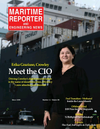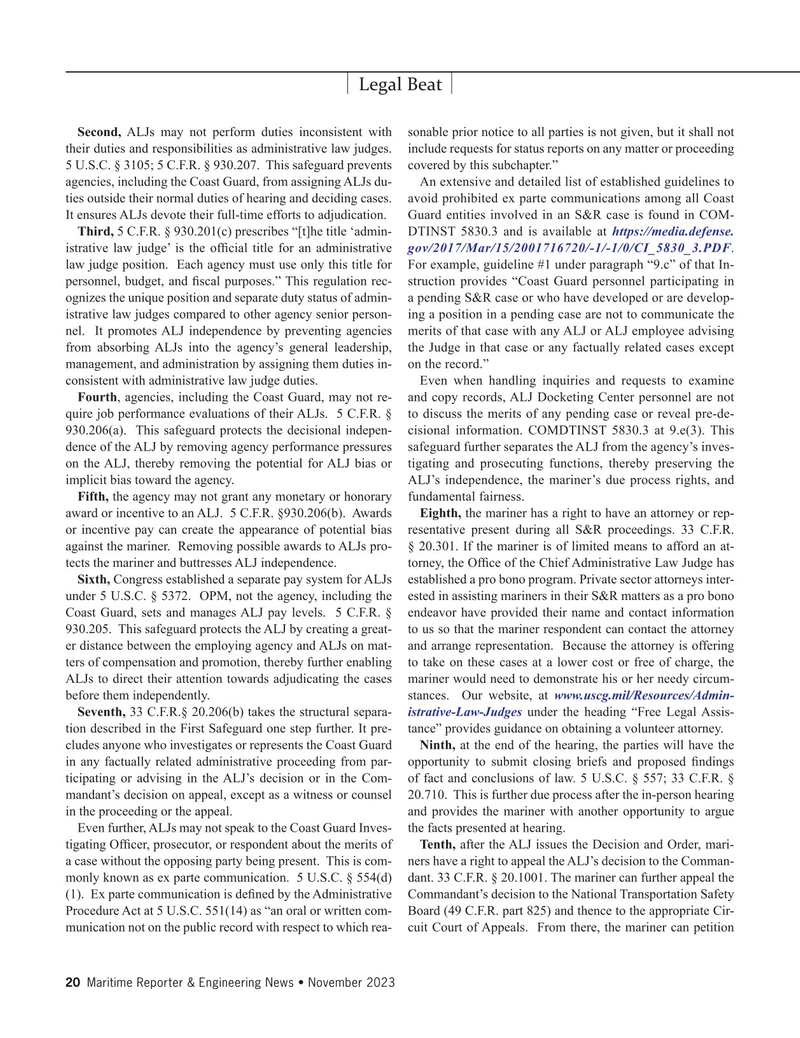
Page 20: of Maritime Reporter Magazine (November 2023)
Workboat Edition
Read this page in Pdf, Flash or Html5 edition of November 2023 Maritime Reporter Magazine
Legal Beat
Second, ALJs may not perform duties inconsistent with sonable prior notice to all parties is not given, but it shall not their duties and responsibilities as administrative law judges. include requests for status reports on any matter or proceeding 5 U.S.C. § 3105; 5 C.F.R. § 930.207. This safeguard prevents covered by this subchapter.” agencies, including the Coast Guard, from assigning ALJs du- An extensive and detailed list of established guidelines to ties outside their normal duties of hearing and deciding cases. avoid prohibited ex parte communications among all Coast
It ensures ALJs devote their full-time efforts to adjudication. Guard entities involved in an S&R case is found in COM-
Third, 5 C.F.R. § 930.201(c) prescribes “[t]he title ‘admin- DTINST 5830.3 and is available at https://media.defense.
istrative law judge’ is the of? cial title for an administrative gov/2017/Mar/15/2001716720/-1/-1/0/CI_5830_3.PDF. law judge position. Each agency must use only this title for For example, guideline #1 under paragraph “9.c” of that In- personnel, budget, and ? scal purposes.” This regulation rec- struction provides “Coast Guard personnel participating in ognizes the unique position and separate duty status of admin- a pending S&R case or who have developed or are develop- istrative law judges compared to other agency senior person- ing a position in a pending case are not to communicate the nel. It promotes ALJ independence by preventing agencies merits of that case with any ALJ or ALJ employee advising from absorbing ALJs into the agency’s general leadership, the Judge in that case or any factually related cases except management, and administration by assigning them duties in- on the record.” consistent with administrative law judge duties. Even when handling inquiries and requests to examine
Fourth, agencies, including the Coast Guard, may not re- and copy records, ALJ Docketing Center personnel are not quire job performance evaluations of their ALJs. 5 C.F.R. § to discuss the merits of any pending case or reveal pre-de- 930.206(a). This safeguard protects the decisional indepen- cisional information. COMDTINST 5830.3 at 9.e(3). This dence of the ALJ by removing agency performance pressures safeguard further separates the ALJ from the agency’s inves- on the ALJ, thereby removing the potential for ALJ bias or tigating and prosecuting functions, thereby preserving the implicit bias toward the agency. ALJ’s independence, the mariner’s due process rights, and
Fifth, the agency may not grant any monetary or honorary fundamental fairness. award or incentive to an ALJ. 5 C.F.R. §930.206(b). Awards Eighth, the mariner has a right to have an attorney or rep- or incentive pay can create the appearance of potential bias resentative present during all S&R proceedings. 33 C.F.R. against the mariner. Removing possible awards to ALJs pro- § 20.301. If the mariner is of limited means to afford an at- tects the mariner and buttresses ALJ independence. torney, the Of? ce of the Chief Administrative Law Judge has
Sixth, Congress established a separate pay system for ALJs established a pro bono program. Private sector attorneys inter- under 5 U.S.C. § 5372. OPM, not the agency, including the ested in assisting mariners in their S&R matters as a pro bono
Coast Guard, sets and manages ALJ pay levels. 5 C.F.R. § endeavor have provided their name and contact information 930.205. This safeguard protects the ALJ by creating a great- to us so that the mariner respondent can contact the attorney er distance between the employing agency and ALJs on mat- and arrange representation. Because the attorney is offering ters of compensation and promotion, thereby further enabling to take on these cases at a lower cost or free of charge, the
ALJs to direct their attention towards adjudicating the cases mariner would need to demonstrate his or her needy circum- before them independently. stances. Our website, at www.uscg.mil/Resources/Admin-
Seventh, 33 C.F.R.§ 20.206(b) takes the structural separa- istrative-Law-Judges under the heading “Free Legal Assis- tion described in the First Safeguard one step further. It pre- tance” provides guidance on obtaining a volunteer attorney. cludes anyone who investigates or represents the Coast Guard Ninth, at the end of the hearing, the parties will have the in any factually related administrative proceeding from par- opportunity to submit closing briefs and proposed ? ndings ticipating or advising in the ALJ’s decision or in the Com- of fact and conclusions of law. 5 U.S.C. § 557; 33 C.F.R. § mandant’s decision on appeal, except as a witness or counsel 20.710. This is further due process after the in-person hearing in the proceeding or the appeal. and provides the mariner with another opportunity to argue
Even further, ALJs may not speak to the Coast Guard Inves- the facts presented at hearing. tigating Of? cer, prosecutor, or respondent about the merits of Tenth, after the ALJ issues the Decision and Order, mari- a case without the opposing party being present. This is com- ners have a right to appeal the ALJ’s decision to the Comman- monly known as ex parte communication. 5 U.S.C. § 554(d) dant. 33 C.F.R. § 20.1001. The mariner can further appeal the (1). Ex parte communication is de? ned by the Administrative Commandant’s decision to the National Transportation Safety
Procedure Act at 5 U.S.C. 551(14) as “an oral or written com- Board (49 C.F.R. part 825) and thence to the appropriate Cir- munication not on the public record with respect to which rea- cuit Court of Appeals. From there, the mariner can petition 20 Maritime Reporter & Engineering News • November 2023
MR #11 (18-33).indd 20 11/2/2023 9:08:37 AM

 19
19

 21
21
